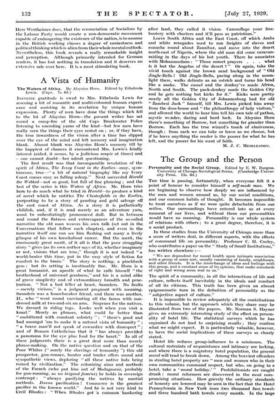A Vista of Humanity
The Waters of Africa. By Aloysius Horn. Edited by Ethelreda Lewis. (Cape. 7s. 6d.) INFINITE gratitude is owed to Mrs. Ethelreda Lewis for rescuing a bit of romantic and multi-coloured human experi- ence and assisting in its revelation by unique human expression. Plenty of men have done the things which fell to the lot of Aloysius Horn—the present writer has sat round a camp-fire of the old Cape Breakwater Police listening to unending yarns of the kind—but few men have really seen the things their eyes rested on ; or, if they have, the true inwardness of the vision after a time has slipped over the eye of the mind and left memory and imagination blank. Almost blank was Aloysius Horn's memory till by the happiest of chances it encountered Mrs. Lewis's kindly interest (aided, it seems, by a judicious soupie at times) and —one cannot doubt—her adroit questioning. • The first result was that incomparable revelation of the spirit of Africa, The lcory Coast in the Earlies—easy, spon- taneous, true—" a bit of natural biography like my Ivory Coast comes easy as falling asleep." Next succeeded Harold the Webbed—not so good, but full of fine phrasing ; and the last of the series is this Waters of Africa. Mr. Horn tries here to do much what he tried in Harold—to produce a kind of novel which he entitles The Chesterfields in the Parties, purporting to be a story of pearling and gold salvage off the east coast of Africa. As a story it is pathetically childish, and, if it is read merely as an adventure yarn, must be unhesitatingly pronounced dull. But in between and round the flatness and extravagances of the so-called narrative the old man weaves his own talk (set out in the Conversations that follow each chapter), and even in the narrative itself one can see him flashing out many a lively glimpse of his own knockabout career. But the merit, the enormously great merit, of it all is that the poor struggling story " gives (as its own author says of it), whether imaginary or not, visions that are true," though it is not indeed " a world-beater this time, put in the easy style of fiction for comfort to the brain." The story is nothing, a pinchbeck gem ; but its setting is inestimably fine. Mr. Horn is a great humanist, an apostle of what he calls himself " the brotherhood of universal goodness," and his is a mind alike of grave simplicity and of extraordinary breadth and pene- tration. " Not a bad feller at heart, Saunders. No faults —merely vicious," is a judgment pregnant with meaning. Saunders was a housebreaker friend, and there was another, H., who " went round vaccinating all the farms with con- densed milk at two-and-six an arm. Sixpence for the natives. We dressed in riding togs. Looks well when you visit a kraal." Merely as phrases, what could be better than " embittered with constant sobriety "-; " there's good and bad amongst 'em to make it a natural vista of humanity " ; " a brave man'll not speak of_ cowardice with disrespect " ; and of Roman Catholicism that it " has always provided a panorama for the eye plus food for the heart." In all of these judgments there is a great deal more than merely phrase-making. On the native question and on that of the Poor Whites (" surely the shavings of humanity ") this old prospector, gun-runner, hunter and trader offers sound and sympathetic views, deploring " all these native lads being ruined by civilization." The colonizing aims and methods of the French (who put him out of Madagasear, probably for gun-running, as un brigand fameici)he holds in sovereign contempt : " alWays pacifying the natives by martial methods. Thorna pacification ! Commerce is the greatest pacifier in the known World." And he is 'mit very' kind to Cecil Rhodes : " When Rhodes 'got a COMmini- hankering after land, they called it vision. Camouflage your free, bootery with charters and it'll pass as patriotism."
Leave South Africa and the East Coast, off which Arabs and white renegades used to run freights of slaves and eunuchs round about Zanzibar, and move into the desert north-east of Nigeria, where the old man did some caravan- raiding in the days of his hot youth. There he associates with Mohammedans : " Those sunset prayers . . . what is it but the Angelus of the desert ? " Or again, take the vivid touch against the brown sand background of " Old Jingle-Bells ! Old Jingle-Bells, pacing along in the moon- light there, walks delicate as an ostrich and turns his head like a snake. The camel and the donkey've made Africa, North and South. The pack-donkey made the Golden City and he gets nothing but kicks for it." Kicks were pretty nearly all the Golden City of Johannesburg had for old " Zambesi Jack " himself, till Mrs. Lewis picked him away from the doss-house and " the philanthropy of lady visitors," and allowed the world to hear him tell his own tale of pathos, mystic wcnder, daring and hard luck. In Aloysius Horn there's something of Borrow, but something far grander than Borrow. Each has the true wizard's touch of elusiveness, though ; from each we can take or leave as we choose, but if he leave anything the reader is the poorer for what he has left, and the poorer for his want of faith.
M. J. C. MEIELEJOHN.


































 Previous page
Previous page